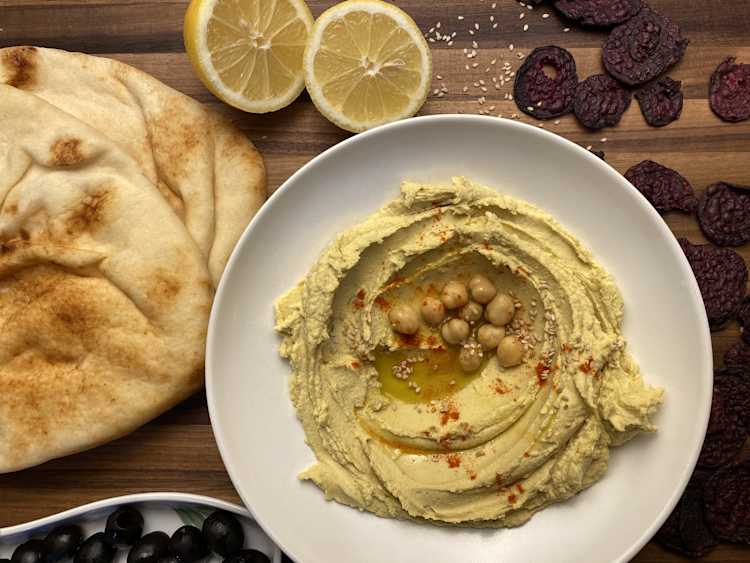Lebanese Hummus

Ingredients
8 servings
- 1 can (15 ounces) chickpeas
- ½ teaspoon of baking soda
- ½ cup tahini
- ½ teaspoon turmeric
- 3 tablespoons of lemon juice
- 2 cloves of garlic
- 1 teaspoon Himalayan salt
- ½ teaspoon of cumin
- ½ cup olive oil
- 3 to 4 tablespoons cold water
- 2 teaspoons sesame seeds, lightly toasted
- ½ teaspoon smoked paprika
- Pinch of cumin
- Splash of olive oil
Preparation
- Place the chickpeas in a medium saucepan and add the baking soda. Generously cover the chickpeas with water, then bring the mixture to a boil over high heat. Continue boiling, reducing heat, if necessary, to prevent it from boiling over - about 10 minutes, or until the chickpeas look bloated.
- In a metal colander, drain the chickpeas. Set aside.
- Put the chickpeas, tahini, turmeric, lemon juice, garlic, salt and cumin in a food processor or high-powered blender. Blend for about a minute. Slowly drizzle in the olive oil.
- Blend until the mixture is thick and creamy, stopping to scrape down any mix stuck to the sides and bottom of the processor as necessary.
- While running the food processor, drizzle in 2 tablespoons cold water. Scrape the sides of the food processor as needed, and blend until the mixture is ultra-smooth, pale and creamy. (You may need to add 1 to 2 tablespoons more ice water.)
- Blend until the mixture is super smooth.
- Taste, and adjust salt and lemon juice to your liking.
- Scrape the hummus into a serving bowl. Top with toasted sesame seeds, smoked paprika, olive oil and cumin. Leftover hummus keeps well covered in the refrigerator for up to 4 days.
Nutrition Facts
Nutrition Facts
8 servings per recipe
Amount per serving
Calories
269
% Daily Value*
Total Fat 23g
29%
Saturated Fat 3.1g
16%
Trans Fat 0.1g
Cholesterol 0mg
0%
Sodium 453.5mg
20%
Total Carbohydrate 12.8g
5%
Dietary Fiber 4.1g
15%
Total Sugars 2g
Includes 0g Added Sugars
0%
Protein 5.5g
Vitamin D 0mcg
0%
Calcium 86.7mg
7%
Iron 2.1mg
12%
Potassium 126.8mg
3%
*
The % Daily Value (DV) tells you how much a nutrient in a serving of food contributes to a daily diet. 2,000 calories a day is used for general nutrition advice.